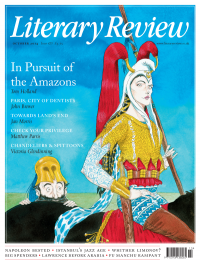Paul Lay
Return of the Narrative
In Lucky Jim, Kingsley Amis’s novel of the frustrations of life in a provincial university, the title character, Jim Dixon, strives to complete what he hopes will be a career-defining article: ‘The Economic Influence of the Developments in Shipbuilding Techniques, 1450 to 1485’. Amis has fun with its ‘funereal parade of yawn-enforcing facts, the pseudo-light it threw upon non-problems’, symptomatic of the humanities’ embrace of the hermetic. And so it may have seemed in 1954. But as Jo Guldi and David Armitage observe in their passionate new polemic, The History Manifesto (Cambridge University Press), just a decade or so later ‘a conscientious supervisor might have discouraged an essay on such an absurdly ambitious and wide-ranging theme’. Ever greater ‘focus’ – a ‘disappointing word’ according to the authors – became central to university training, with a calamitous effect on the historical profession’s engagement with the public.
Guldi, a young scholar based at Brown University, and the Harvard-based British historian Armitage blame such reductionist self-indulgence on the short-termism endemic in Western societies, with their permanent election campaigns and quarterly business cycles. More specifically, they point the finger at the ‘inward turn’ taken by academic historians around forty

Sign Up to our newsletter
Receive free articles, highlights from the archive, news, details of prizes, and much more.@Lit_Review
Follow Literary Review on Twitter
Twitter Feed
Literary Review is seeking an editorial intern.
Though Jean-Michel Basquiat was a sensation in his lifetime, it was thirty years after his death that one of his pieces fetched a record price of $110.5 million.
Stephen Smith explores the artist's starry afterlife.
Stephen Smith - Paint Fast, Die Young
Stephen Smith: Paint Fast, Die Young - Jean-Michel Basquiat: The Making of an Icon by Doug Woodham
literaryreview.co.uk
15th-century news transmission was a slow business, reliant on horses and ships. As the centuries passed, though, mass newspapers and faster transport sped things up.
John Adamson examines how this evolution changed Europe.
John Adamson - Hold the Front Page
John Adamson: Hold the Front Page - The Great Exchange: Making the News in Early Modern Europe by Joad Raymond Wren
literaryreview.co.uk